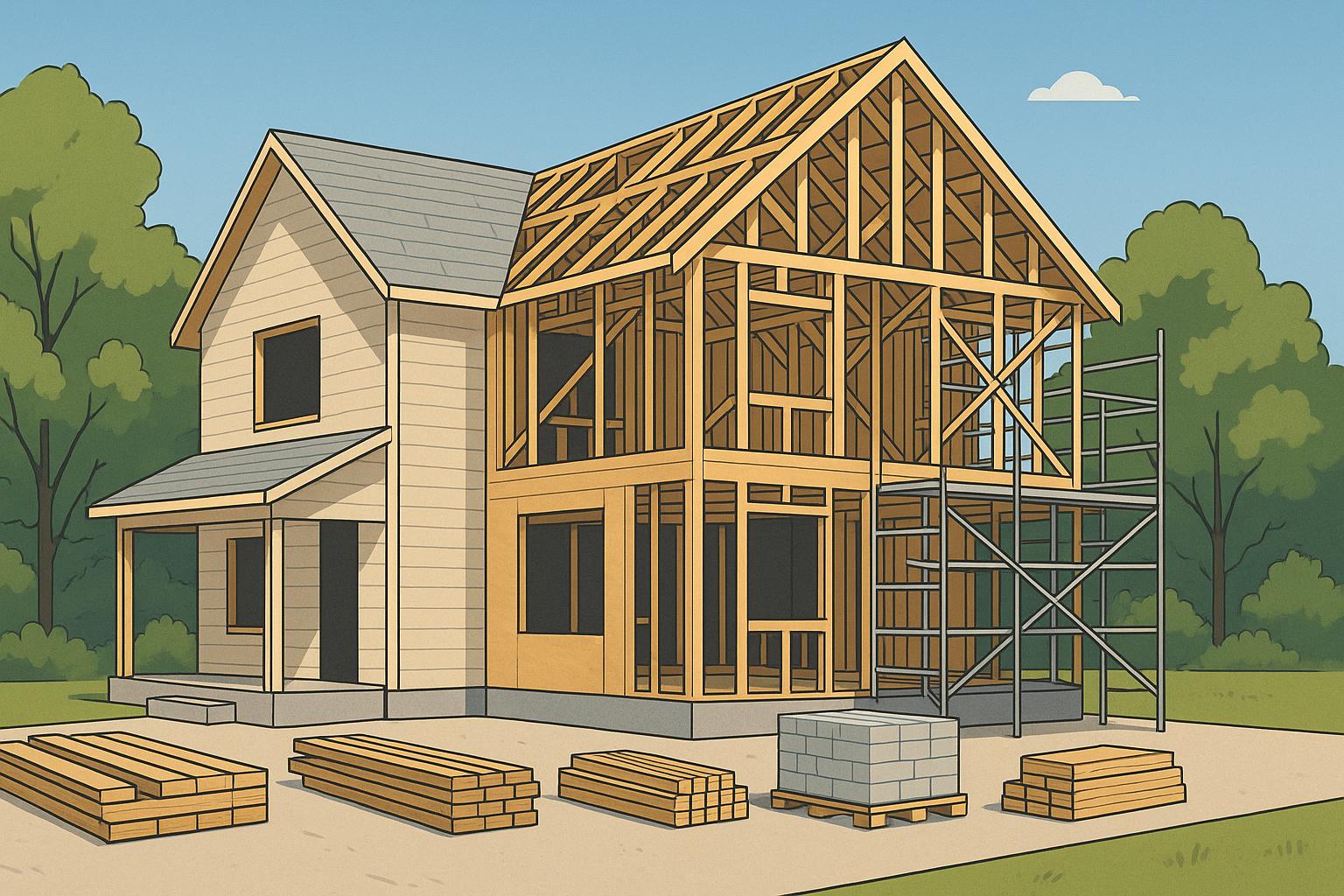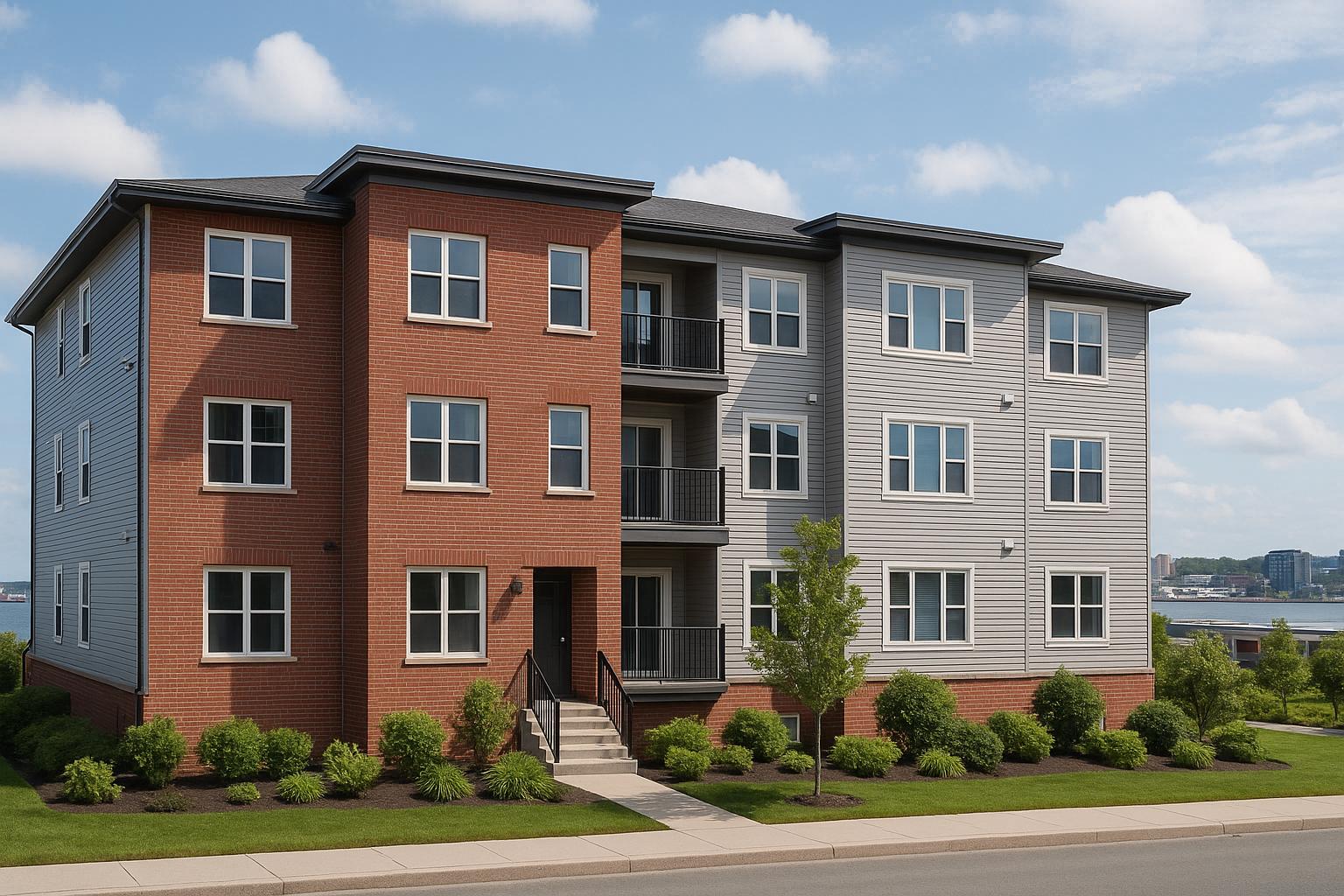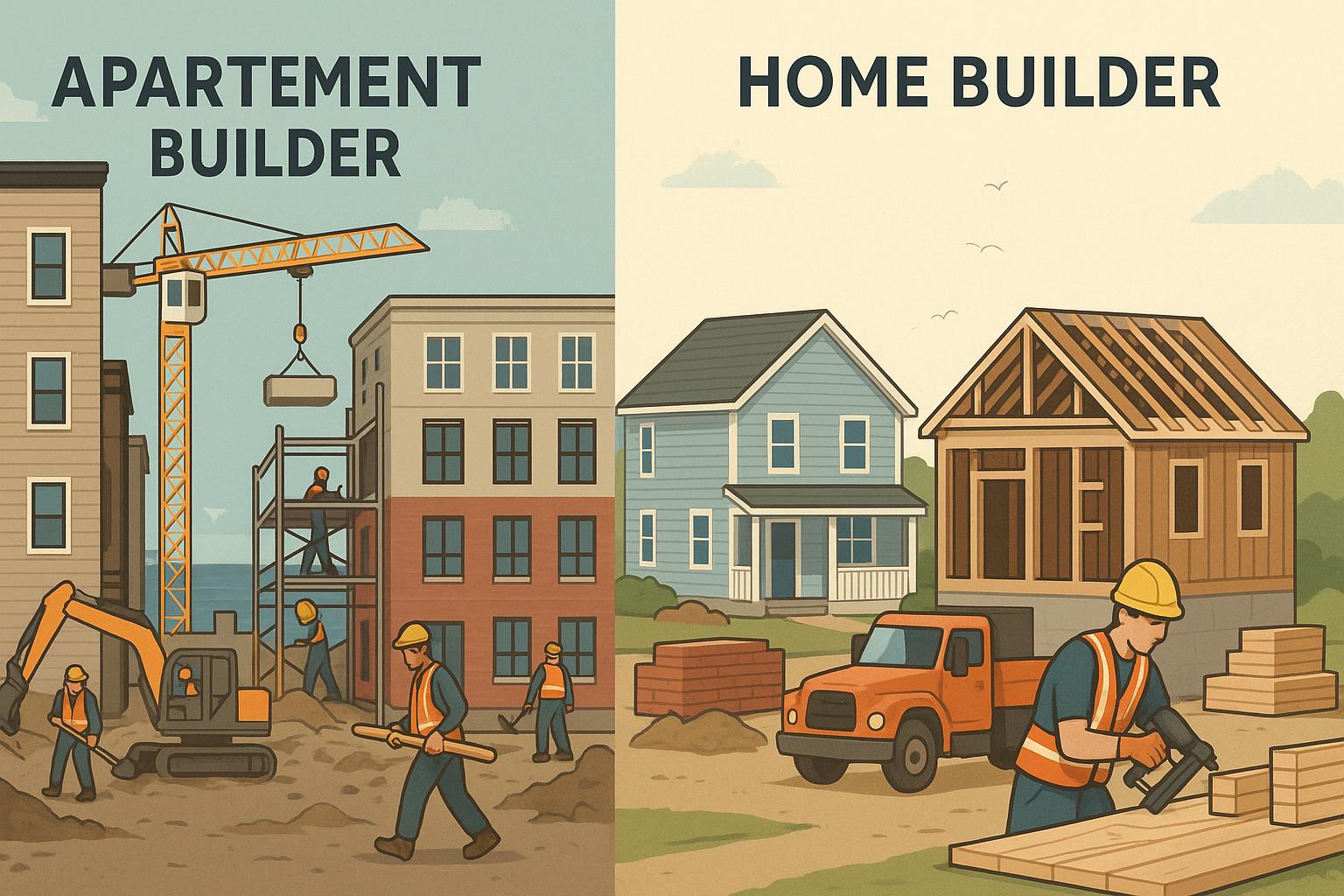Owning an older home in Nova Scotia comes with challenges, especially when dealing with the province’s harsh climate and rising rental market expectations. If you're deciding between rebuilding or renovating, here’s what you need to know:
- Rebuild: Offers a modern, energy-efficient home with predictable costs and timelines. It’s ideal for properties with major structural issues or for maximizing rental income. Costs average $160,000–$200,000 per unit, with potential rents of $1,950–$2,100/month.
- Renovate: Retains the existing structure while improving functionality and energy efficiency. It’s a cost-effective choice for homes in good condition but can lead to unexpected expenses. Renovations may limit rental income compared to new builds.
Key Takeaway: Rebuilding provides a fresh start with fewer surprises, while renovations work best for preserving existing structures on a budget. Your decision depends on the property’s condition, your financial goals, and the rental market.
Quick Comparison:
| Factor | Rebuild | Renovate |
|---|---|---|
| Cost | $160,000–$200,000 per unit | Varies widely; hidden issues likely |
| Timeline | ~6 months | Weeks to months, depending on scope |
| Rental Income | Higher ($1,950–$2,100/month) | May be limited by older layouts |
| Energy Efficiency | Modern and up-to-code | Targeted upgrades, less overall gain |
Consider consulting a structural engineer to assess your property before deciding.
Should You Renovate or Rebuild? How to Know If Your Home Is a Teardown
1. Rebuild
Rebuilding replaces the old structure with a modern property that meets today’s standards. This option gives property owners complete control over the design and layout, making it a popular choice for those looking to create a tailored, efficient rental property. Let’s break down the key factors, including costs, timelines, code compliance, and rental income potential.
Cost
In Nova Scotia, rebuilding multi-unit rental properties generally costs around $160,000 per unit. For instance, constructing a fourplex would come to about $640,000 under standard construction practices. Alternatively, property owners can opt for a CMHC MLI Select build, which costs approximately $200,000 per unit. While this option is more expensive, it delivers a property that is 40% more energy efficient than standard builds and comes with attractive financing options, such as:
- 95% financing with only a 5% down payment
- A 50-year amortization period
For those looking to make their units rental-ready immediately, there’s the Premium Rental Ready Package. For an additional $15,000 per unit, this package includes features like Energy Star appliances, smart home technology, and window coverings - ideal for owners who want to hit the ground running.
Timeline
Using an integrated design-build approach, rebuilding projects can be completed in as little as six months. By streamlining the process - design, permits, and construction - this method minimizes delays and allows property owners to start earning rental income sooner.
Building Code Compliance
Rebuilding ensures that the property meets the latest National Building Code requirements and energy efficiency standards. This means the property will adhere to modern safety, accessibility, and performance guidelines, reducing the risk of costly retrofits in the future.
Rental Income Potential
Modern, purpose-built rental units often attract higher rental rates in Nova Scotia’s competitive market. These units typically deliver annual returns of 12–20%, with many property owners experiencing positive cash flow right away. With the financing benefits provided by CMHC MLI Select standards, these strong returns become even more achievable.
2. Renovate
Renovating your Nova Scotia home is a great way to improve its functionality and energy efficiency while keeping its original structure intact. Many homeowners in the province opt for renovations to preserve the charm of older homes, all while ensuring they meet modern rental standards.
Cost
The cost of renovations can range significantly. Small cosmetic updates are relatively budget-friendly, but larger projects - like upgrading systems or replacing finishes - can quickly become expensive. Hidden issues, such as outdated wiring, plumbing, or structural problems, can also drive up costs unexpectedly. These surprises can make it tricky to stick to both budgets and timelines.
Timeline
The time needed for renovations depends on the project's complexity. Simple updates might be wrapped up in a few weeks, while more extensive work - especially those involving structural changes or system upgrades - can take several months. Coordinating schedules for multiple tradespeople, such as electricians, plumbers, and painters, often adds to the timeline.
Building Code Compliance
Just like new construction, renovations must comply with current building codes. However, existing structures can sometimes complicate the process. Minor cosmetic changes usually don’t trigger major code requirements, but larger projects often necessitate updates to meet today’s standards. This could mean upgrading electrical panels, improving ventilation, or ensuring accessibility.
For older homes, some original features may remain untouched if the changes are minimal. However, significant renovations often require full compliance with modern codes. Even a focused renovation, like a kitchen remodel, might require additional updates to align with current regulations.
Rental Income Potential
A well-planned renovation can increase rental income, but older layouts might limit how much rent you can charge compared to a newly built property. It’s important to weigh the total renovation investment against the potential rental return and the strength of the local market. Balancing these factors will help ensure your renovation adds value.
sbb-itb-16b8a48
Pros and Cons
Deciding between rebuilding or renovating your Nova Scotia property involves weighing several factors, from costs to timelines and long-term value. Here's a breakdown to help you make an informed choice:
| Factor | Rebuild Pros | Rebuild Cons | Renovate Pros | Renovate Cons |
|---|---|---|---|---|
| Upfront Cost | Predictable, fixed pricing | Higher initial investment | Lower entry cost for cosmetic updates | Hidden issues can inflate costs by 30-60% |
| Timeline | Guaranteed completion schedule | Longer overall project duration | Faster for minor updates | Coordination challenges with multiple trades |
| Energy Efficiency | Modern systems reduce long-term costs | Higher cost for advanced materials | Targeted upgrades improve specific areas | Older systems limit overall efficiency gains |
| Rental Income | Achieves premium rents ($1,950–2,100/month) | No rental income during construction | Phased work keeps units rent-producing | Layout limitations may cap rental potential |
| Financing | Construction mortgages available | May require a larger down payment | Home equity loans are easier to access | Limited borrowing against aging structures |
| Quality Control | Single accountability for the project | Complete disruption during the build | Preserves existing character and charm | Multiple contractors can lead to disputes |
Now, let’s break this down into three key dimensions: cost predictability, timeline management, and revenue outcomes.
Financial Predictability
Managing costs is a major concern, especially in Halifax, where renovation expenses typically range from $125–175 per square foot [1]. It’s wise to set aside an additional 15–20% for unexpected issues. Labour alone can make up over 40% of total costs [1], which means older properties are particularly prone to budget overruns. Rebuilding offers a more controlled, fixed-price approach, while renovations can be less predictable due to hidden structural problems.
Timeline Management
Rebuilding offers a clear, systematic process with guaranteed completion dates, making it easier to plan around. On the other hand, renovations often involve juggling multiple contractors, which can lead to delays. While renovations might be quicker for minor updates, larger projects can stretch well beyond initial estimates due to coordination challenges.
Revenue Impact
When it comes to rental income, rebuilding has a clear trade-off: you’ll lose rental revenue during construction, but the completed property can command premium rents ($1,950–2,100/month). Renovations, however, allow for phased work, which means you can keep units occupied and generating income during the process [2]. That said, older layouts or structural limitations might restrict how much you can charge in rent after the work is done.
Long-term Value
A new build often comes with fewer surprises down the road, thanks to modern materials and a 2-year warranty. Renovations, while preserving the charm of an older property, may lead to ongoing maintenance and repair costs.
For property owners who value predictability and streamlined outcomes, rebuilding offers the advantage of single accountability and fixed pricing. However, those working with tighter budgets might lean toward renovations, despite the potential for unexpected costs and scheduling hurdles. Each option has its strengths, so your decision will ultimately depend on your goals, budget, and timeline.
Conclusion
Deciding between rebuilding and renovating comes down to weighing your financial goals, the property's condition, and the current market demand.
Rebuilding tends to work best for properties with serious structural issues or when aiming to boost long-term rental income. It also offers clearer costs and timelines, reducing many of the uncertainties that come with traditional renovations.
On the other hand, for properties with a solid structure and a more modest budget, focused renovations can still add significant value. This is particularly true if you can keep units occupied during phased updates. However, coordinating multiple trades can be a challenge, requiring careful planning to avoid delays or miscommunication.
It's a good idea to consult a structural engineer to assess your property and uncover any hidden issues before making a decision.
Finally, keep Nova Scotia's strong rental market in mind. Well-designed multi-unit properties are in demand, so whether you rebuild or renovate, aim to create rental spaces that appeal to modern tenants. By aligning your strategy with your budget and long-term goals - and working with a reliable team - you can set yourself up for success and maximize your investment.
FAQs
How do I know if my home's structural issues mean I should rebuild instead of renovate?
Deciding between rebuilding or renovating begins with a detailed professional evaluation of your home's current state. Important aspects to examine include the foundation's stability, the condition and safety of electrical and plumbing systems, as well as the quality of insulation and overall energy efficiency.
If the property shows extensive structural issues, outdated systems, or major energy inefficiencies, rebuilding might be the more practical and cost-effective option. A rebuild allows you to modernize your home, align it with current building codes, and adapt it to market expectations, which can enhance its long-term value and appeal.
What are my financing options for rebuilding or renovating a home in Nova Scotia?
If you're planning to rebuild or renovate your home in Nova Scotia, there are a variety of financing options worth considering:
- Housing Repair Program: This program offers financial support for emergency repairs or upgrades related to health and safety. You could qualify for grants of up to $18,000. For larger-scale projects, a repayable loan of up to $20,000 might also be an option.
- Secondary and Backyard Suite Incentive Program: This program provides a forgivable loan that covers up to 50% of eligible expenses, with a maximum of $40,000, for constructing a secondary or backyard suite on your property.
- Home Equity Loans or Lines of Credit: Many financial institutions, including Scotiabank, offer home equity financing solutions specifically designed for renovations. These allow you to tap into your property’s value to fund your project.
It’s worth noting that some programs, such as the Canada Greener Homes Loan, have recently stopped accepting applications. Be sure to verify the availability and eligibility requirements for any program before moving forward.
What unexpected challenges or costs should I consider when renovating an older home in Nova Scotia?
Renovating an older home in Nova Scotia comes with its fair share of surprises - some of which can have a big impact on your budget and timeline. It’s not uncommon to uncover issues like mould, outdated electrical systems, or structural problems that need immediate attention. Ignoring these could not only delay your project but might also affect whether your home is insurable.
Costs can also pile up in unexpected ways. Whether it’s additional site preparation, permit fees, or complications that only come to light once the work begins, these unforeseen expenses can quickly add up. On top of that, if your contractor isn’t compliant with Workers’ Compensation regulations, you could be financially liable if an accident happens during the renovation.
To keep things on track, it’s essential to hire seasoned professionals who are familiar with the quirks of older homes in Nova Scotia. They can help you navigate these challenges and provide a detailed, upfront plan to make your renovation as smooth as possible.



